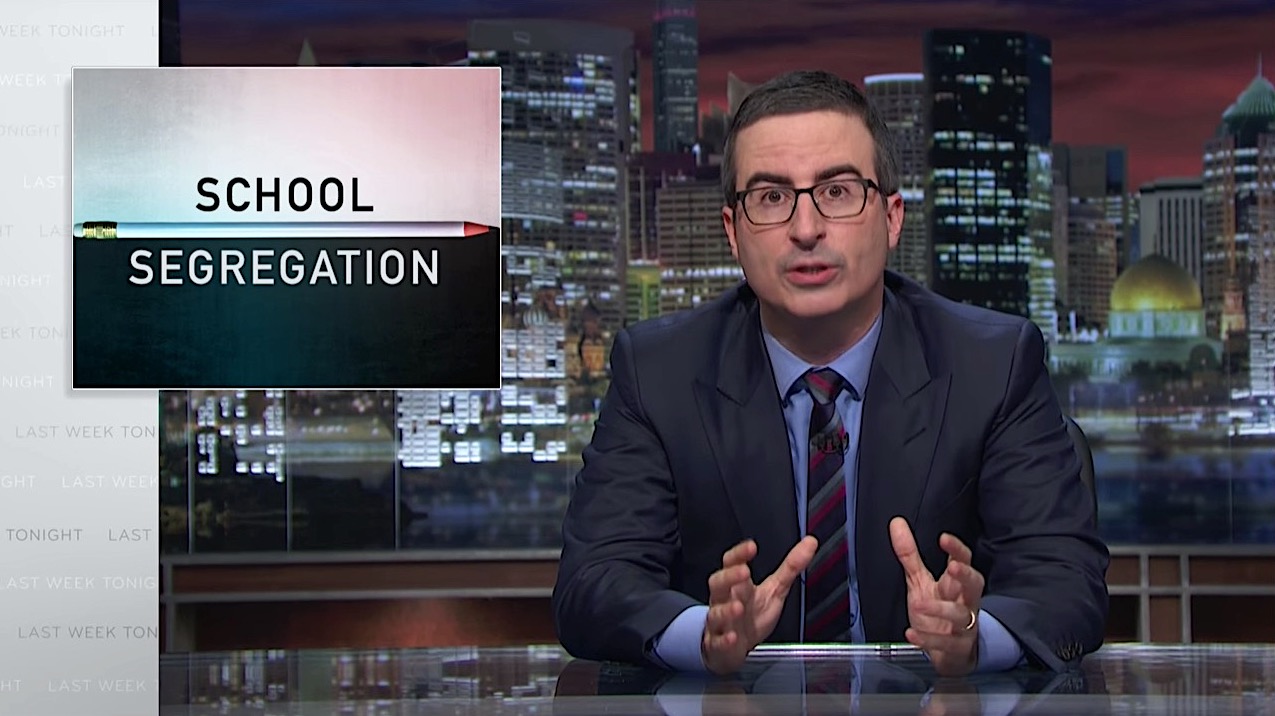John Oliver explains to white people why, in 2016, school segregation 'is still a big problem'


A free daily email with the biggest news stories of the day – and the best features from TheWeek.com
You are now subscribed
Your newsletter sign-up was successful
Tonight, more than 60 years after Brown v. Board of Education, John Oliver said on Sunday's Last Week Tonight, "we're going to discuss school segregation, which it turns out is still a big problem." He started with a little dig at his audience: "Now at this point, if you are in a city like New York, you're probably thinking, 'Oh, splendid, I know where this is going: a story vilifying the backwards and racist American South. Let me just grab a handful of kale chips that I can munch on while feeling superior.' Well hold on, there is probably something you should know." The South is the most integrated part of the U.S., he noted, kind of smugly, and New York City is the least.
Segregated schools "are very rarely equal in any way," Oliver noted, and black and Latino students bear a serious cost. "So how is it possible that our nation's schools are, by some measures, more segregated now than they have been in over four decades?" he asked. It turns out that places like New York City "never really bothered integrating in the first place," and the 1964 Civil Rights Act didn't make them — it was crafted by Northern lawmakers to undo the segregation "by law" in the South, but exempted the "racial imbalance" of Northern schools, Oliver explained, noting that Malcolm X was pointing this out at the time.
Part of this is about the money that flows to schools when white students are put in them, Oliver said. "Funding tends to follow white people around the way white people follow the band Phish around." But there are other tangible benefits to black and Latino students in segregated schools, too — and no measurable downside to white students.
The Week
Escape your echo chamber. Get the facts behind the news, plus analysis from multiple perspectives.

Sign up for The Week's Free Newsletters
From our morning news briefing to a weekly Good News Newsletter, get the best of The Week delivered directly to your inbox.
From our morning news briefing to a weekly Good News Newsletter, get the best of The Week delivered directly to your inbox.
"I get the impulse to seize every tiny advantage for your kid — I get that — but segregated schools cause devastating harm to actual children, and not just to their education but to their very sense of self worth," Oliver said. So what's in it for white people? Oliver suggests your white child's lack of exposure to black and Latino kids will embarrass you — and that well-intentioned white kid in blackface should give parents pause. But actually, "there are massive and multiple benefits for all of us if they interacted a lot more from an early age," he said. You can watch his argument below. Peter Weber

A free daily email with the biggest news stories of the day – and the best features from TheWeek.com
Peter has worked as a news and culture writer and editor at The Week since the site's launch in 2008. He covers politics, world affairs, religion and cultural currents. His journalism career began as a copy editor at a financial newswire and has included editorial positions at The New York Times Magazine, Facts on File, and Oregon State University.
-
 Minnesota's legal system buckles under Trump's ICE surge
Minnesota's legal system buckles under Trump's ICE surgeIN THE SPOTLIGHT Mass arrests and chaotic administration have pushed Twin Cities courts to the brink as lawyers and judges alike struggle to keep pace with ICE’s activity
-
 Big-time money squabbles: the conflict over California’s proposed billionaire tax
Big-time money squabbles: the conflict over California’s proposed billionaire taxTalking Points Californians worth more than $1.1 billion would pay a one-time 5% tax
-
 ‘The West needs people’
‘The West needs people’Instant Opinion Opinion, comment and editorials of the day
-
 ‘One Battle After Another’ wins Critics Choice honors
‘One Battle After Another’ wins Critics Choice honorsSpeed Read Paul Thomas Anderson’s latest film, which stars Leonardo DiCaprio, won best picture at the 31st Critics Choice Awards
-
 A peek inside Europe’s luxury new sleeper bus
A peek inside Europe’s luxury new sleeper busThe Week Recommends Overnight service with stops across Switzerland and the Netherlands promises a comfortable no-fly adventure
-
 Son arrested over killing of Rob and Michele Reiner
Son arrested over killing of Rob and Michele ReinerSpeed Read Nick, the 32-year-old son of Hollywood director Rob Reiner, has been booked for the murder of his parents
-
 Rob Reiner, wife dead in ‘apparent homicide’
Rob Reiner, wife dead in ‘apparent homicide’speed read The Reiners, found in their Los Angeles home, ‘had injuries consistent with being stabbed’
-
 Hungary’s Krasznahorkai wins Nobel for literature
Hungary’s Krasznahorkai wins Nobel for literatureSpeed Read László Krasznahorkai is the author of acclaimed novels like ‘The Melancholy of Resistance’ and ‘Satantango’
-
 Primatologist Jane Goodall dies at 91
Primatologist Jane Goodall dies at 91Speed Read She rose to fame following her groundbreaking field research with chimpanzees
-
 Florida erases rainbow crosswalk at Pulse nightclub
Florida erases rainbow crosswalk at Pulse nightclubSpeed Read The colorful crosswalk was outside the former LGBTQ nightclub where 49 people were killed in a 2016 shooting
-
 Trump says Smithsonian too focused on slavery's ills
Trump says Smithsonian too focused on slavery's illsSpeed Read The president would prefer the museum to highlight 'success,' 'brightness' and 'the future'
